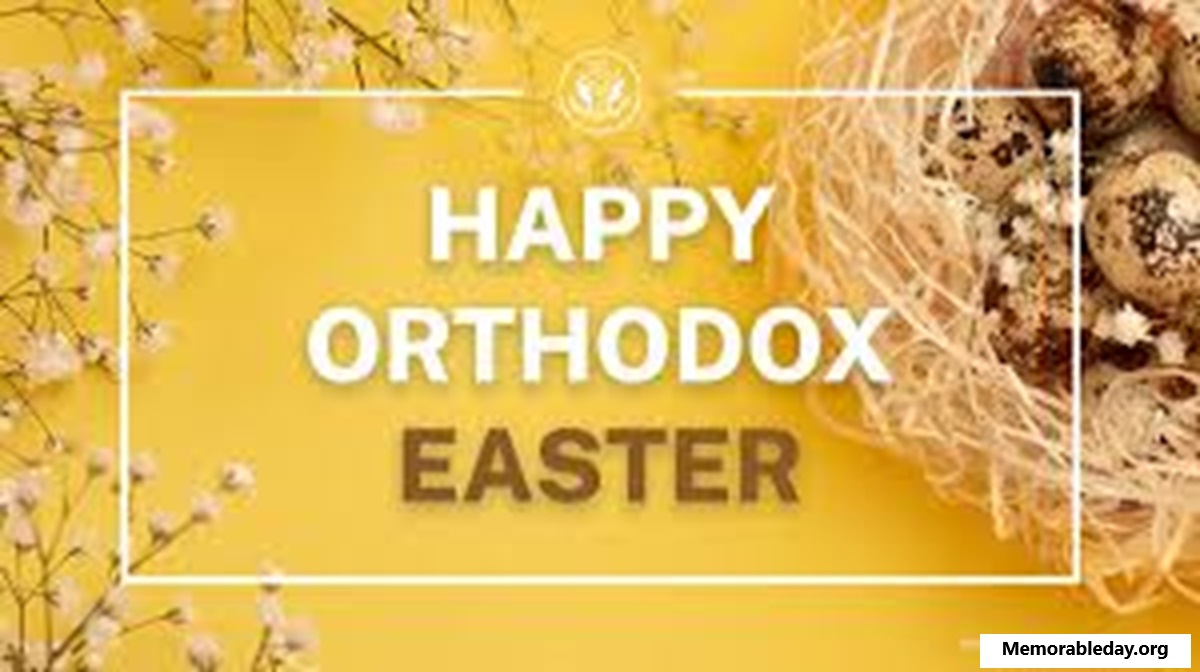
Orthodox Easter, also known as Pascha, is one of the most significant celebrations in the Christian Orthodox calendar. It marks the resurrection of Jesus Christ and holds deep spiritual meaning for millions of believers worldwide. This year, Orthodox Easter falls on May 5th, offering an opportunity to reflect on faith, enjoy traditional customs, and gather with family and friends.
Orthodox Easter is a celebration of hope, renewal, and joy. It symbolizes the triumph of life over death and serves as a reminder of God’s infinite love and grace. Although it often falls on a different date than Western Easter due to differences in the calendars used by various Christian traditions, Orthodox Easter remains one of the most spiritually rich and vibrant celebrations in Christianity.
The History of Orthodox Easter
The origins of Orthodox Easter date back to the early days of Christianity. The celebration is rooted in the Jewish Passover and the events of Holy Week, culminating in the resurrection of Jesus Christ. Unlike Western churches, which follow the Gregorian calendar, Orthodox churches adhere to the Julian calendar to calculate the date of Easter. This difference often results in Orthodox Easter being celebrated later than its Western counterpart.
Historically, Orthodox Easter customs have evolved over centuries, blending ancient Christian traditions with regional practices. Despite the variations, the core message of Pascha—the victory of life over death—remains unchanged.
When is Orthodox Easter Celebrated?
Orthodox Easter is celebrated on a date that usually falls after Western Easter, depending on the lunar calendar and the timing of Passover. In 2025, Orthodox Easter will be observed on May 5th. This date changes yearly, but it is always celebrated on a Sunday between April 4th and May 8th.
How Do We Celebrate Orthodox Easter?
Orthodox Easter celebrations are a rich blend of religious rituals, festive customs, and communal joy. These include:
- Holy Week Services: The week leading up to Easter is filled with special services, each reflecting different moments in Christ’s Passion.
- Dyeing Red Eggs: Eggs symbolize new life, and the red color represents the blood of Christ. These eggs are cracked together as a symbol of resurrection.
- Midnight Liturgy: On Saturday night, the faithful gather for a midnight service, holding candles that symbolize the light of Christ’s resurrection.
- Feasting: After a period of fasting during Lent, families enjoy traditional dishes like lamb, tsoureki (sweet bread), and magiritsa (a lamb soup).
- Sharing Greetings and Gifts: Friends and family exchange warm wishes and celebrate the joy of the resurrection.
Why is Orthodox Easter Celebrated?
Orthodox Easter is celebrated to honor the resurrection of Jesus Christ, which is central to the Christian faith. It represents hope, renewal, and eternal life. For Orthodox Christians, this day is not just a historical commemoration but a living reality, reflecting their belief in salvation and God’s victory over sin and death. By celebrating Pascha, believers reaffirm their faith and find spiritual renewal.
Celebrate Orthodox Easter on May 5th
This year, on May 5th, Orthodox Christians around the world will unite in joyful celebration. Churches will be filled with the glow of candles, the sound of hymns, and the shared spirit of peace and love. Whether you’re attending a midnight service or enjoying a festive meal with loved ones, take time to reflect on the true meaning of this holy day.
Orthodox Easter Quotes
- “Christ is risen, and life reigns.”
- “Easter is the time to rejoice and be grateful for the gift of salvation.”
- “May the miracle of Easter fill your heart with hope.”
- “Let your light shine before others, just as Christ’s light shines in our lives.”
- “Rejoice, for the Lord has risen in glory!”
- “The resurrection is the foundation of our faith.”
- “With God, all things are possible—even victory over death.”
- “Easter brings the message of eternal life and love.”
- “He is risen! Alleluia!”
- “The greatest gift of Easter is hope.”
(Additional quotes available upon request.)
Orthodox Easter Wishes
- “Wishing you a blessed and joyful Orthodox Easter!”
- “May the light of the resurrection fill your heart with peace.”
- “Happy Orthodox Easter! Christ is risen!”
- “May this Pascha bring you love and happiness.”
- “May your Easter be as bright as the promise of the resurrection.”
Orthodox Easter Greetings
- “Christos Anesti! (Christ is risen!)”
- “Happy Orthodox Easter to you and your family!”
- “Wishing you the blessings of Pascha.”
- “May the joy of Easter fill your home.”
- “He is risen indeed! Celebrate with love and faith.”
Orthodox Easter Messages
- “On this holy day, may you be surrounded by love and light.”
- “Easter reminds us of God’s boundless love—may you feel it in abundance.”
- “Let us rejoice together as we celebrate the resurrection!”
- “Wishing you peace, joy, and renewed faith this Pascha.”
- “May the miracle of Easter bring you hope and inspiration.”
Conclusion, Orthodox Easter is a celebration of life, love, and renewal. It’s a time to reflect on our faith, gather with family, and embrace the joy of Christ’s resurrection. As you celebrate on May 5th, may your heart be filled with peace, and your home with happiness. Remember, Pascha is not just a holiday—it’s a reminder that light always triumphs over darkness, and love never fails.
Orthodox Easter FAQs
1. Why does Orthodox Easter fall on a different date than Western Easter?
Orthodox Easter follows the Julian calendar, while Western churches use the Gregorian calendar. This often results in different dates.
2. What is the significance of red eggs?
Red eggs symbolize the blood of Christ and the promise of new life. Cracking the eggs represents the resurrection.
3. How long does Orthodox Easter last?
Orthodox Easter celebrations begin during Holy Week and continue for 40 days, ending with the Feast of the Ascension.
4. What are traditional Orthodox Easter foods?
Some popular dishes include lamb, tsoureki (sweet bread), magiritsa (lamb soup), and koulourakia (butter cookies).
5. What does ‘Christos Anesti’ mean?
‘Christos Anesti’ is Greek for ‘Christ is risen.’ It is the traditional Easter greeting among Orthodox Christians.






